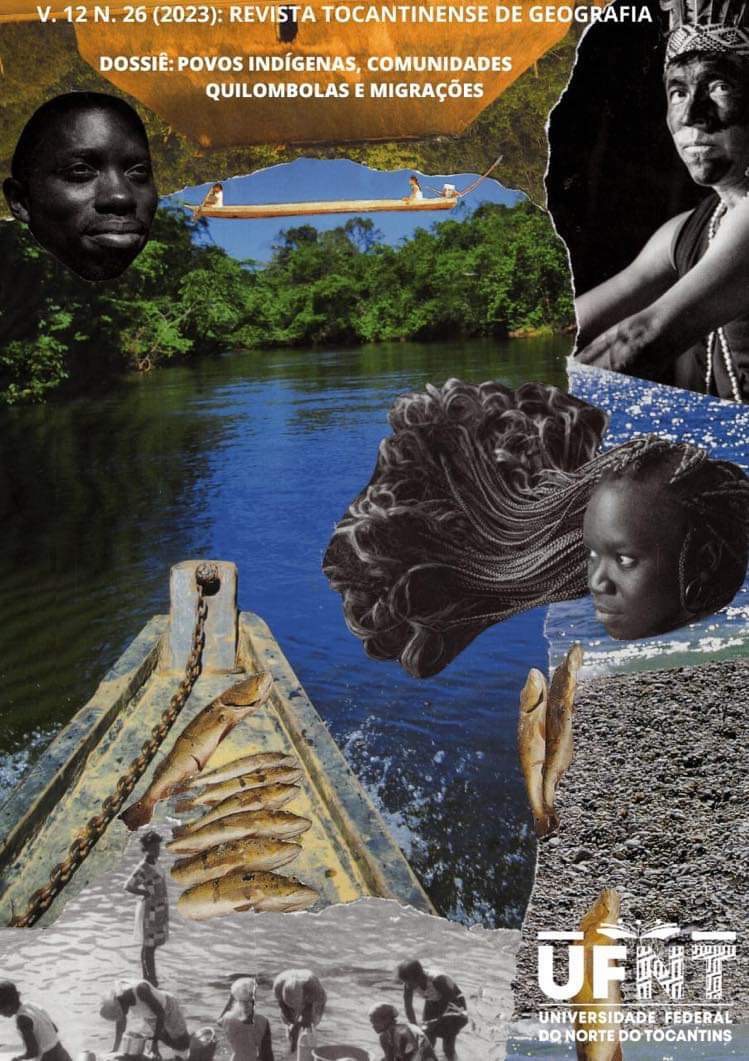A TERRITORIALIDADE DOS JENIPAPO-KANINDÉ NA REGIÃO METROPOLITANA DE FORTALEZA/CE
DOI :
https://doi.org/10.20873/rtg.v12i26.15382Mots-clés :
Território, Territorialidade, Jenipapo-KanindéRésumé
A finalidade deste trabalho é apresentar a territorialidade dos Jenipapo-Kanindé, da Terra Indígena Lagoa da Encantada, localizada na Região Metropolitana de Fortaleza/CE. Para tanto, fizeram-se necessários os seguintes procedimentos metodológicos: levantamento bibliográfico; leitura e interpretação de dados secundários; organização de cartogramas e tabelas, bem como realização de trabalhos de campo que contou com observação da paisagem e entrevista com integrantes da comunidade indígena investigada. Tivemos como resultado a identificação da territorialidade, salientando a organização territorial, o perfil populacional, o sistema de ensino, o perfil e distribuição das moradias, as áreas de lazer, as associações e a estruturação econômica dos Jenipapo-Kanindé. Diante do apresentado, concluímos que a territorialidade da população investigada se constitui com base num crescimento populacional positivo e numa formação grupal pautada na produção de uma economia agrícola coletiva e num sistema de ensino que possibilita o fortalecimento da identidade indígena. Constatamos ainda a existência de uma organização habitacional aos padrões urbanos coexistindo com rugosidades em relação ao padrão das construções. Verificamos também as territorialidades por meio da atuação das associações, enquanto espaços de convivência e lugar em que se faz presente o protagonismo da mulher indígena. Por fim, constatamos a existência de uma Geografia dos povos originários diversa, protagonista e resistente frente à ação dos agentes hegemônicos.
Références
ANDRADE, Manuel Correia. A questão do território no Brasil. São Paulo: Hucitec; Recife: IPESPE, 1995.
BOMTEMPO, Denise Cristina. Migração internacional, economia urbana e territorialidades. Boletim Goiano de Geografia, v. 39, p. 1-26, 2019.
BOMTEMPO, Denise Cristina. Dinâmica territorial, atividade industrial e cidade média: as interações espaciais e os circuitos espaciais da produção das indústrias alimentícias de consumo finais instaladas na cidade de Marília – SP. 2011. 455f. Tese (Doutorado) - Programa de Pós-graduação em Geografia, Universidade Estadual Paulista " Júlio Mesquita Filho" Presidente Prudente, 2011.
CARNEIRO DA CUNHA, Manuela. Política indigenista no século XIX. In: CARNEIRO DA CUNHA, Manuela. (Org.). História dos índios no Brasil. São Paulo: Companhia das Letras, Secretaria Municipal de Cultura, FAPESP, 1992.
HAESBAERT, Rogério. Território e multiterritorialidade: um debate. GEOgraphia, v. 9, n. 17, 8 fev. 2010.
INSTITUTO BRASILEIRO DE GEOGRAFIA E ESTATÍSTICA – IBGE. Tendências Demográficas: Uma análise dos indígenas com base nos resultados da amostra dos Censos Demográficos 1991 e 2000. Rio de Janeiro, 2005.
INSTITUTO DE PESQUISA E ESTRATÉGIA ECONÔMICA DO CEARÁ – IPECE. Indicadores economicos do Ceará 2017. Ceará, 2017. Disponível em: https://www.ipece.ce.gov.br/wpcontent/uploads/sites/45/2019/02/Indicadores_Economicos_2013_a_2017.pdf. Acesso em: 9 de setembro de 2019.
MONDARDO, Marcos Leandro. Em defesa dos territórios indígenas no Brasil: direitos, demarcações e retomadas. Geousp, v. 26, n. 1, e-176224, abr. 2022. ISSN 2179-0892. Disponível em: https://www.revistas.usp.br/geousp/article/view/176224. Doi: https://doi.org/10.11606/issn.2179-0892.geousp.2022.176224.
OLIVEIRA FILHO, João Pacheco de. Entrando e saindo da “mistura”: os índios nos censos nacionais. In: OLIVEIRA FILHO, João Pacheco de. (Org.). Ensaios em Antropologia histórica. Rio de Janeiro: Contra Capa Livraria, LACED, 1999. p. 124-151. apud. LUSTOSA, Isis Maria Cunha. Os povos indígenas, o turismo e o território: um olhar sobre os Tremembé e os Jenipapo-Kanindé do Ceará. 2012. 280 f. Tese (Doutorado em Ciencias Humanas) - Universidade Federal de Goiás, Goiânia, 2012.
PINHEIRO, Francisco José. Notas sobre a formação social do Ceará. Fortaleza: Fundação Ana Lima, 2008.
RAFFESTIN, Claude. Por uma Geografia do Poder. São Paulo: Ática, 1993.
RATTS, Alecsandro José Prudêncio.Trajetórias e memórias de negros migrantes. Travessia. São Paulo, v. 32, p. 14-16, 1998.
SACK, Robert. Human territoriality: Its theory and history. Cambridge: Cambridge
University Press, 1986.
SOUZA, Marcelo Lopes de. O território: sobre espaço, poder, autonomia e desenvolvimento. In: CASTRO et al. (orgs.). Geografia: conceitos e temas. Rio de Janeiro: Bertrand Brasil.
SPOSITO, Eliseu Savério. SAQUET, Marcos Aurélio. O Conceito de território no Brasil:
Entre o urbano o rural. Caderno Prudentino de Geografia, Presidente Prudente, n.38, v.2, p.84-112, ago/dez 2016.
Téléchargements
Publié-e
Comment citer
Numéro
Rubrique
Licence
© Journal de géographie Tocantinense 2023

Cette œuvre est sous licence Creative Commons Attribution - Pas d'Utilisation Commerciale - Pas de Modification 4.0 International.
Revista Tocantinense de Geografia ne rémunère aucun auteur pour la publication de ses textes. Le contenu des textes publiés dans cette revue relève de la responsabilité des auteurs.









.png)












